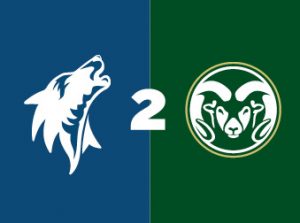Wolves to Rams NIH Paid Traineeship
The application is closed, and will re-open in spring 2025
This traineeship provides training and experience in biomedical and behavioral research for 6 FRCC students per year. The program lasts for two full years, outlined below. Trainees receive CSU transfer advising, research skills training, W2R community support, peer mentoring, monthly stipends, and tuition payments. In total, trainees receive financial support of up to $40,000 over 24 months between FRCC and CSU.
This traineeship requires a commitment from students over two academic years, including two summers. Although students from any FRCC campus can participate, most weekly program activities in fall 2024 and spring 2025 are at FRCC Larimer Campus.
Having paid research experience is critical for students pursuing behavioral and biomedical fields such as psychology, biomedical engineering, health and exercise science, microbiology, medical school, pharmaceuticals, biology, neuroscience, and many other human health fields.
FRCCFall 2024 |
FRCCSpring 2025 |
CSUSummer 2025 |
CSUFall 2025 |
CSUSpring 2026 |
CSUSummer 2026 |
Full-Time Classes 12-15 Credits5 hours of program activities/week (FRCC Larimer)up to $1,100/month stipendup to $2,400 tuition payment |
Full-Time Classes 12-15 Credits5 hours of program activities/week (FRCC Larimer)up to $1,100/month stipendup to $2,400 tuition payment |
40 hours/week 10 weeks for research lab workup to $1,100/month stipend$300/week for travel and food costs |
Full-Time Classes 12-15 Credits15 -20 hours of research/weekup to $1,100/month stipendup to $3071 tuition payment |
Full-Time Classes 12-15 Credits15 -20 hours of research/weekup to $1,100/month stipendup to $3071 tuition payment |
40 hours/week 10 weeks for research lab workup to $1,100/month stipend$300/week for travel and food costs |
Eligibility Requirements
- Currently enrolled at FRCC (any campus)
- Have already earned a high school diploma or GED prior to fall semester 2024
- Have not previously earned a bachelor’s degree (it’s ok if you have attended a university)
- Plan to be enrolled at FRCC for fall 2024/spring 2025, and plan to transfer to CSU for fall 2025
- US citizen, permanent resident, or have refugee/asylum status
- Eligible for federal financial aid with FAFSA on file at FRCC for 2024-2025 academic year (FRCC FAFSA code is 007933)
- Willing to attend ON-CAMPUS trainings at FRCC Larimer campus every week during fall and spring semesters
- Willing to work 40 hours/week in a CSU research lab during summer 2025 and summer 2026
- Interested in any of the following eligible CSU majors: biomedical sciences (pre-med), psychology, health & exercise science, nutrition & food science, microbiology, public health, any engineering degree, biochemistry, biology, chemistry, computer science, mathematics, statistics, physics, or zoology (or any related fields to the above).
How to Apply
- The application is currently closed, and will re-open spring semester 2025.
- After you submit your application, you will receive a confirmation page with important information. Applicants will not be notified of their status until after the application deadline has passed.
- Type your essay responses into a Word/Google document so you don’t lose your work – then copy and paste them into the application.
-
-
Essay Question #1: Read the following two articles “What is Undergraduate Research?” and “Why Undergraduate Research?”.
Now answer the following question: Based on the information given in the articles, which of the benefits of undergraduate research is most appealing to you, and why? Can you think of any other benefits (not mentioned in the articles) of conducting research as an undergraduate student?(250 words max)
- Essay Question #2: Using an online search, find a research lab at CSU Fort Collins. List the name of the lab, the topic they are researching, and a hyperlink to the webpage.
In your own words, describe why the research conducted in this lab is an important contribution to the science field. What did you learn that you did not know before reading through the research descriptions?
If you don’t know where to start, try this (250 words max)
-
-
-
Essay Question #3: Describe your journey, after high school, towards becoming a scientist and exploring science and research. (250-500 words)
-
This program is funded by the National Institutes of Health.

